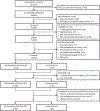Evaluation of a computerized contraceptive decision aid: A randomized controlled trial
- PMID: 32771369
- PMCID: PMC7821473
- DOI: 10.1016/j.contraception.2020.08.002
Evaluation of a computerized contraceptive decision aid: A randomized controlled trial
Abstract
Objective: To evaluate the effectiveness of a contraceptive decision aid in reducing decisional conflict among women seeking reversible contraception.
Study design: We conducted a randomized trial of a computer-based decision aid compared to a control group for women presenting for reversible contraception at two clinics affiliated with an academic medical center. The primary outcome was change in decisional conflict, measured before and after the healthcare visit using the validated Decisional Conflict Scale. We hypothesized the decision aid would reduce the decisional conflict score by 10 points on a 100-point scale (0 = no conflict, 100 = high conflict) compared to the control group. Secondary outcomes included contraceptive method chosen and satisfaction with the healthcare visit.
Results: We enrolled and randomized 253 women, and 241 had complete data for our primary outcome. Overall, pre-visit decisional conflict scores were low, reflecting low levels of decisional conflict in our sample; median score 15 (range 0-80) in the decision aid and 10 (0-85) in the control group (p = 0.45). Both groups had a similar reduction in median decisional conflict after the healthcare visit: -10 (-80 to 25) and -10 (-60 to 5) in the decision aid and control groups respectively (p = 0.99). Choice of contraception (p = 0.23) and satisfaction with healthcare provider (p = 0.79) also did not differ by study group.
Conclusions: Decisional conflict around contraception was low in both groups at baseline. Use of a computerized contraceptive decision aid did not reduce decisional conflict, alter method choice, or impact satisfaction compared to the control group among women choosing reversible contraception.
Implications: Use of a computerized contraceptive decision aid did not reduce decisional conflict or alter method choice compared to the control group among women choosing reversible contraception. Future studies could focus on testing the decision aid in different clinical settings, especially where barriers to providing comprehensive contraceptive counseling exist.
Keywords: Contraception; Contraceptive counseling; Decisional conflict; Patient decision aid.
Copyright © 2020 Elsevier Inc. All rights reserved.
Conflict of interest statement
Conflicts of Interest
Dr. Madden serves on a data safety monitoring board for phase 4 safety studies of Bayer contraceptive products. Dr. Peipert receives research funding from Bayer Healthcare Pharmaceuticals, CooperSurgical/TEVA, and Merck & Co, Inc. and serves on an advisory board for CooperSurgical Pharmaceuticals. Dr. Politi receives research funding from Merck & Co. The other authors do not have any potential conflicts of interest to report.
References
-
- Donnelly KZ, Foster TC, Thompson R. What matters most? The content and concordance of patients’ and providers’ information priorities for contraceptive decision making. Contraception. 2014;90:280–7. - PubMed
-
- Lessard LN, Karasek D, Ma S, et al. Contraceptive features preferred by women at high risk of unintended pregnancy. Perspect Sex Reprod Health. 2012;44:194–200. - PubMed
-
- Gomez AM, Clark JB. The relationship between contraceptive features preferred by young women and interest in IUDs: an exploratory analysis. Perspect Sex Reprod Health. 2014;46:157–63. - PubMed
Publication types
MeSH terms
Substances
Grants and funding
LinkOut - more resources
Full Text Sources


